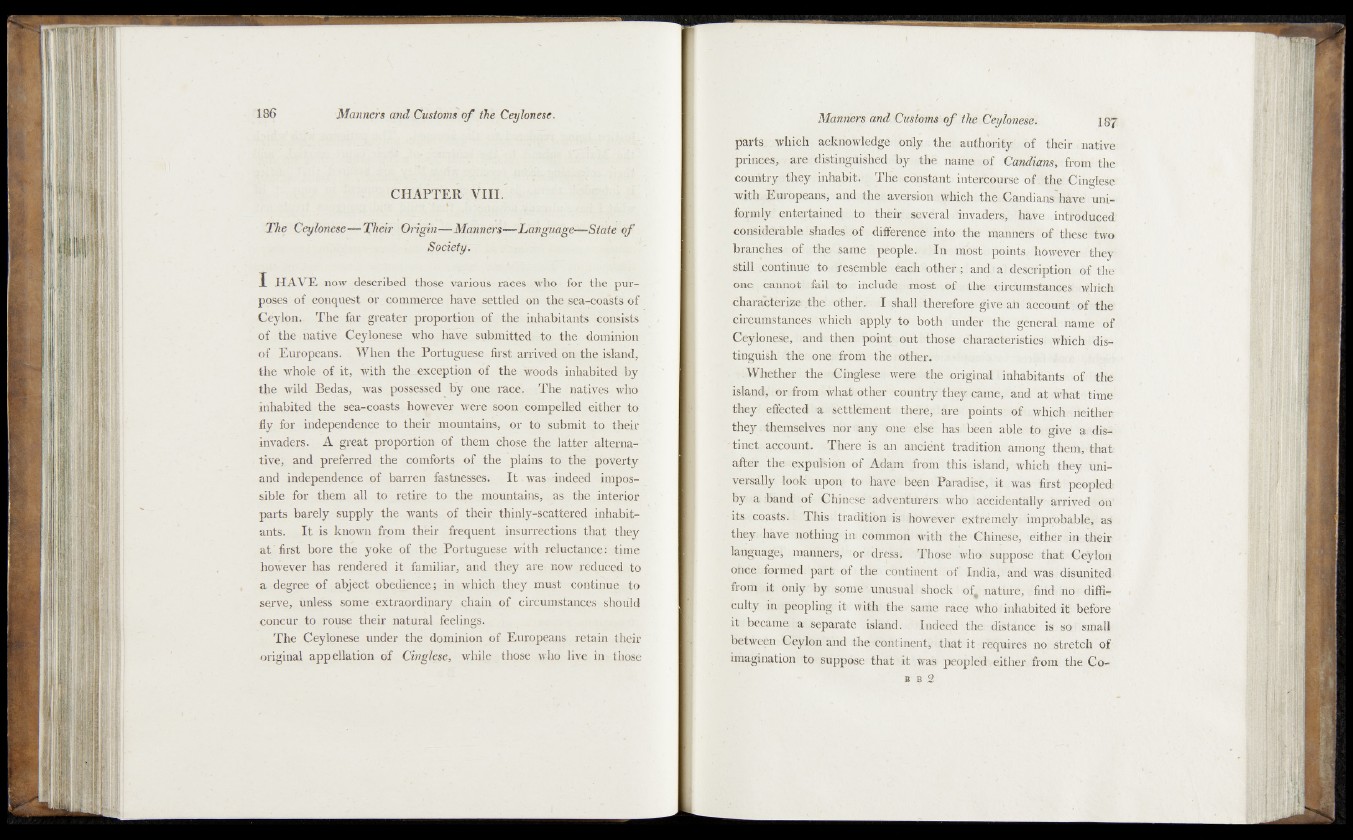
CHAPTER V III.
The Ceylonese-*- Their Origin—Manners—Language— State o f
Society7
I HAVE now described those various races, -who- for the purposes
of conquest or commerce have settled on the;sea-coasfs of
-Ceylon.. The far greater proportion of the inhabitants |eBÿli§ts-
of the native - Ceylonese who have submitted to the dominion
of Europeans. , When-the Portuguese first arrived iOfrfh^island,
the whole of it, with the_exreption of the /woods inhabited d|y
the wild Bedas, was possessed by one ra c e ^ /p h e natip&| who
inhabited th e sea-coasts however were soon compelled
fly: fqr independence to their mountain’s, -.or "to,-Submit-to thek
invaders. A great proportion of them chose the latter -alternative;,
and preferred the comforts o f the plains to. poverty
and independence of barren fastnesses. I t . wasîjindeed impossible
for them, all to retire to the mountains likatethe. interior
parts barely supply the wants of their thinly-scattered inhabitants.
I t is known from their frequent insurrections fha^ they
at "first bore the yoke of IheJPortuguese with.rehictaniceh,!tjme
however has rendered it familiar, and they are^snow- reduced to
a degree of abject obedience; in which they m u s t-continue^t,to
serve, unless some • extraordinary chain of, circumstances shpiild
concur , to; rouse their natural feelings.
The Geylonese under the dominion of Europeans retain their
original appellation of Cinglese, while those who live in- those
parts. | whishr acknowledge- ■ br%n; thes-auth^#yd. of their 4natives
princes* - are. distinghishedr%y;«fehe natnfafof Gandjansi, .'from- the-
cophtry if hey .inhabit^ The/constant inte^mirse of ,:the jGiftglesef
w ith, -Europeans,, and. the^i«efsxon^j^ph.fh^^3andiansffhave!Luni>-!
. frflhid entertained .ito-A%hH^|§|^dralwflnvaflea?^; have intfodiiieed;
cphsiddcable shadesijof difference* Mo »the wanhdrs'iof f these^lwo
branches ■ &ame h people .v ?' In'; most-« points/; howeven-Ithdik
Still continue' .to-dieaemhle-each,othehsia©*kahdesctiption--<©f the
onfe, eannbsfefaiteto-« ihcludqymost ,©f ^h©?®i<Keiims;tanees' > iwhicfe
-characterize-thetjother-i iolvshaflldhherefom give/ah" 'aeGOiMttof^he^
^j^pistanGes, whifeh -apply do both * -uiper vthe ^ n^ aln nar^ 'of
C^OnB^,handj themi'poin^cMHhos© oharaoterisfeiesi vwtfidk#dxs^
tinguaslf Attnonei/from the «other.
-> . Whether iJtheMg inglese-; weremthe original i inhabitants^cif > !ith©-
iskndd^®Kfeomt^h^Mher^eouAi^dhfy>Gatme, and afr*whal' time
tteyi effected .^fiitettlhmentnifheMplare-! poMs^i«#fiwhid‘uiiieitheB
riteyxifhnmselv’^ 3#rna®uy ©herbel# 'hasxbteeii able to give '•sflrJfefc?:
|tinel^account. ^T«liere 'is | all Ancient traditiolUamong- thekr-that:
afte’r thewsxphMon of A dam/from; this-, island, which* they universally
lo&k! upon to have* beto t Ta-rad-ise, i t ^ a ^ , iistH'peoptedx
by fa, band^of- Chines^advewturersi whto $accidentally«'arrivedteh'
its ©oaiSts^f This tradition-iis'chowever extremelys^cnprobablesl as
ttey.. have xiothiixg in common with the Chinese, fitteroinofhiir'
language; manners, 'orirdres&s Thosei/whoxi suppose; dbat Geyloxi
ohoenfo-rtoedi part df) the continent Serf Indiab affl^'-waS' disunited
fooitfM only/ by some ■vunusual|’sbobk-I of^ natufe, jfindbn$ndiffw
culty in. [peopling it with the same face who finhabited iSfrgforq
i t if became-j af- .separate island. Indeed' .the; - distance: is- sdf'Srnalfj
between Ceylon and the’Continentkthat'it- rbqudTe^'nocsSt^tch of
imagination to suppose th a t' it was peopled"eijthpi» from the Co-
b b 2